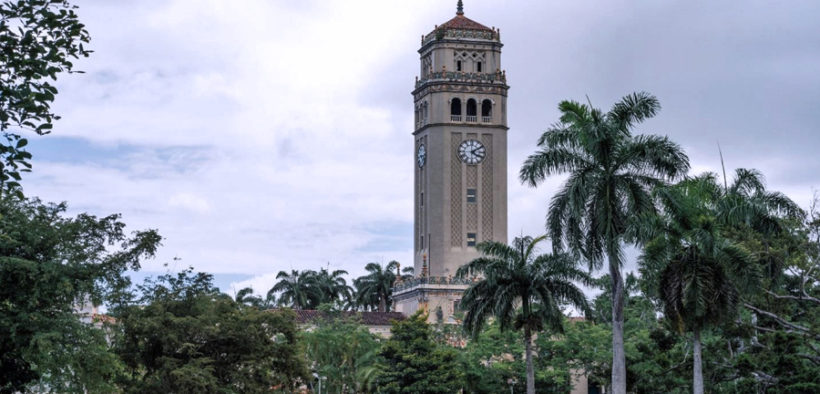CNE: Changes to UPR fiscal budget ‘unilaterally changes part of social contract’

The University of Puerto Rico’s Fiscal Plan “unilaterally changes a significant part of our social contract, redistributing the risk and responsibility of providing higher education outside the state and toward the individual and the private sector,” said Sergio Marxuach, policy director at the Center for a New Economy.
“The modern social contract in developed societies can be defined as the collective provision of at least some minimum level of public safety, housing, education, and health care, and protections for the young, the old, and the physically and mentally disabled,” said Marxuach, in this month’s edition of the “CNE Review,” the Puerto Rico-based think-tank’s publication.
In its publication, the CNE analyzed the impact of government bankruptcy on the island’s public university and other aspects of the institution’s crisis, as the academic semester begins at the University of Puerto Rico.
Among the issues addressed in the publication are how the Financial Oversight and Management Board for Puerto Rico (FOMB), “has radically and unilaterally changed the terms of the Puerto Rican social contract;” the relationship between higher education, investment, and economic growth; and some of the research projects that have been put at risk by budget cuts.
The UPR’s administrative, financial, and operational challenges are also analyzed, as well as the role that public universities have in promoting research and development (R&D) in other countries.
The proposed budget cuts at the UPR would hinder all R&D activity in Puerto Rico,” said Raúl Santiago-Bartolomei, CNE research associate and assistant professor at the UPR’s Graduate School of Planning at the Río Piedras campus.
By 2019, the UPR was responsible for 82% of total investment for R&D by higher education institutions, while the university itself financed a fifth of the total invested by these institutions, Santiago-Bartolomei said.
In addition, the UPR has several research centers and facilities that are unique in Puerto Rico.
Meanwhile, total investment in R&D in Puerto Rico reached 0.54% of the Gross Domestic Product (GDP) in 2017, a figure that pales in comparison to the United States (2.79% of GDP) and the leading countries, South Korea (4.3% of GDP) and Japan (3.2% of GDP), the CNE stated.
The UPR as an institution has been “seriously hurt, both by the magnitude of the budget cuts imposed by the FOMB and by the university’s administrators’ lack of imagination in handling the crisis: together they have created an institutional paralysis,” said Jorge L. Giovannetti-Torres, a professor and guest writer for the August edition of the “CNE Review.”
The budget cuts “have been enforced without rethinking or restructuring the UPR as a system,” he said.
One of the detrimental effects of this situation is that the faculty has seen its opportunities for research and publication reduced.
“Both are essential elements to increase prestige and attract external funds and students to the UPR, which in turn are critical to reverse the current situation,” he said, noting that “the UPR should have a central role in shaping Puerto Rico’s future and be the main referent for public policy and social discussions on issues ranging from global warming and crime to economic and sociocultural development.”
The need for institutional reforms at the UPR is urgent, he said, but these should be aimed at creating a research university, capitalizing on the prestige and strengths of the institution, rethinking the campuses, seeking academic and administrative synergies, and strengthening the spaces for the creation of knowledge, research, and international projection, the guest columnist concluded in his analysis.
CNE’s publication dedicated to the UPR also includes a look at key international trends regarding public universities.
Jennifer Wolff, director of CNE’s Madrid Policy Bureau, said “the increasing complexity of economic, environmental, and social problems has turned universities into crucial nodules of technological and social innovation.”
“This role is particularly important in the case of [places] like Puerto Rico that don’t have robust R&D infrastructures. Public universities around the world have a very important role as scientific and social catalysts,” she said.
“If we look at other parts of the world, we see how those countries that reduced investment in R&D during periods of economic crisis today face a notable erosion of their public capital stock. By contrast, those countries that maintained public investment in university education today score well in terms of their innovation ecosystems,” said Wolff
“Instead of chopping up Puerto Rico’s public university system into pieces, the right thing to do would be to think how to reconstruct it for the future,” she said, adding that “the magnitude of the budget cuts inflicted on the UPR at a time when Puerto Rico faces such complex challenges threatens the island’s possibilities for reconstruction and future economic recovery.”












